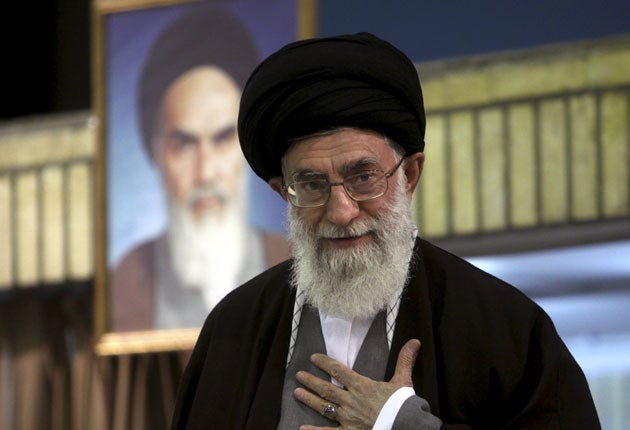Your support helps us to tell the story
From reproductive rights to climate change to Big Tech, The Independent is on the ground when the story is developing. Whether it's investigating the financials of Elon Musk's pro-Trump PAC or producing our latest documentary, 'The A Word', which shines a light on the American women fighting for reproductive rights, we know how important it is to parse out the facts from the messaging.
At such a critical moment in US history, we need reporters on the ground. Your donation allows us to keep sending journalists to speak to both sides of the story.
The Independent is trusted by Americans across the entire political spectrum. And unlike many other quality news outlets, we choose not to lock Americans out of our reporting and analysis with paywalls. We believe quality journalism should be available to everyone, paid for by those who can afford it.
Your support makes all the difference.Iran's supreme leader has urged Iranians to vote in large numbers as the country holds parliamentary elections today, saying a high turnout would send a strong message to the enemies of the nation.
The ballot for the 290-member parliament is the first major voting since the disputed re-election of President Mahmoud Ahmadinejad in June 2009 and the mass protests and crackdowns that followed.
It is unlikely to change Iran's course over major policies - including its nuclear stand-off with the West - regardless of who wins, but it may shape the political landscape for a successor to Mr Ahmadinejad in 2013.
Ayatollah Khamenei, who has final say on all state matters in Iran, said it was a "duty and a right" for every eligible Iranian to vote, especially now that the "Iranian nation is at a more sensitive period" amid the confrontation with the West.
"Because of the controversies over Iran and increased verbal threats ... the more people come to the polling stations the better for the country," Mr Khamenei said after casting his ballot in Tehran.
"The higher turnout, the better for the future, prestige and security of our country," he added. "The vote always carries a message for our friends and our enemies."
A high turnout will be seen as a major boost for Iran's ruling Islamic system, showing popular support and allowing it to stand firm in the stand-off over its nuclear programme. The West suspects the programme is geared toward making nuclear weapons, a charge Tehran denies, insisting it is for peaceful purposes only, such as energy production.
Iranian state TV went live from several polling stations in Tehran and the provinces, showing long queues of people waiting to vote, followed by a commentary saying the lines would be a "disappointment to the bad-wishers."
It claimed the vote was more critical than previous elections because the US and its allies allegedly hope for a low turnout that would show divisions and a weakened Islamic theocracy, making it easier for the West to pressure Iran over its nuclear program.me The TV headlines proclaimed the elections as a day of "national solidarity" and a "rebirth of the nation."
More than 48 million Iranians are eligible to vote at the nearly 47,000 polling stations across the nation.
In the absence of major reformist parties, which were kicked off the political stage over the 2009 post-election riots, today's vote is seen as a political battleground for competing conservative factions that support Mr Khamenei and those backing Mr Ahmadinejad.
The two top conservative groups, which were once united, have turned against each other after crushing reformists in the upheavals that followed Mr Ahmadinejad's disputed re-election.
The vote is also a curtain raiser for next year's presidential election. A defeat for Mr Ahmadinejad supporters would virtually guarantee a Khamenei loyalist as the next president and present a seamless front against Western efforts to curb Iran's uranium enrichment programme.
Iran's parliament carries more powers than most elected bodies in the Middle East, including setting budgets and having influential advisory committees such as national security and foreign affairs. The current parliament is led by a former nuclear negotiator, Ali Larijani.
But the chamber still lacks any direct ability to force policy decisions on Mr Khamenei or the powerful forces under his control, including the Revolutionary Guard military establishment.

Join our commenting forum
Join thought-provoking conversations, follow other Independent readers and see their replies
Comments